ARTEMIS WRATH 1
Greek Name
Αρτεμις
Transliteration
Artemis
Latin Spelling
Artemis
Translation
Diana

ARTEMIS was the Olympian goddess of hunting, wild animals, children and birth.
This page contains tales of the goddess' wrath incited by threats to her virginity and offences against her mother Leto. The most famous of these stories include the hybristic boasts of Niobe, the hunter Aktaion who spied upon her bath, the Aloadai giants who would take her for a bride and the lusts of the giant Orion.
The two other "Wrath" pages explore different themes.
(1) WRATH AVENGER OF LETO
LEIMON An Arkadian man (southern Greece) who induced his people to expel the pregnant goddess Leto when she came to the land seeking refuge. The gods Apollon and Artemis later appeared, seeking to avenge their mother, and Leimos slew his brother out of fear of accusation. Artemis saw his guilt, and in her wrath, struck him down with arrows.
NIOBE A queen of Thebes in Boiotia (central Greece) who was excessively proud of her 14 children and claimed superiority in motherhood over the goddess Leto. Apollon and Artemis, her divine children, rushed to their mother's defence, descended upon Thebes and struck down the 14 children with their arrows (Apollon the seven boys, and Artemis the seven girls). Some say, Artemis was merciful, and spared the youngest daughter.
PYTHON A giant dragon-serpent of Phokis (central Greece) who pursued the goddess Leto during her pregnancy and guarded the shrine of Delphoi. After their birth, Apollon and Artemis exacted revenge, slaying the monster with their arrows. (Most versions, however, say that it was Apollon alone who slew the beast).
TITYOS (Tityus) A giant of Phokis (central Greece) who attempted to rape the goddess Leto as she was passing through the region. Her children Apollon and Artemis rushed to her rescue and slew the Gigante with their arrows, despatching him to Haides and eternal torture as punishment for the offense.
(2) WRATH DEFENCE OF VIRGINITY
AKTAION (Actaeon) A young prince and hunter of Thebes in Boiotia (central Greece) who incurred the wrath of Artemis by spying upon her as she bathed (though some say he merely came across he by accident, but nevertheless failed to avert his gaze). She transformed him into a stag and then incited his hounds to tear him apart in a mad frenzy.
ALOADAI, THE (Aloadae) Twin giants from Thessalia (northern Greece) who attempted to storm heaven and seize the goddesses Hera and Artemis for their wives. Artemis assumed the form of a deer and rushed between them, tricking them into casting their spears, missing, and felling each other instead.
BOUPHAGOS (Buphagus) An Arkadian man (southern Greece) who attempted to rape the goddess Artemis. She, in her wrath, struck him down with deadly arrows.
ORION A giant of Delos or Krete (Greek Aegean) who was slain by Artemis, either because he boasted to be superior to the goddess in hunting, or because he attempted to rape the goddess or one of her companions. (In other versions of the story he was a friend of the goddess, slain by Gaia, or the goddess herself through a trick of her brother Apollon).
SIPRIOTES A boy who was transformed into a girl by the goddess Artemis when he accidentally came across the goddess bathing.
CLASSICAL LITERATURE QUOTES
Callimachus summarises the wrath of Artemis in his hymn to the goddess:-
Callimachus, Hymn 3 to Artemis 258 ff (trans. Mair) (Greek poet C3rd B.C.) :
"Let none disparage Artemis. For Oineus dishonoured her altar and no pleasant struggles came upon his city. Nor let any contend with her in shooting of stags or in archery. For the son of Atreus [Agamemnon] vaunted him not that he suffered small requital. Neither let any woo the Maiden; for not Otos, nor Orion wooed her to their own good. Nor let any shun the yearly dance; for not tearless to Hippo [queen of the Amazones] was her refusal to dance around the altar."
ARTEMIS WRATH : NIOBE
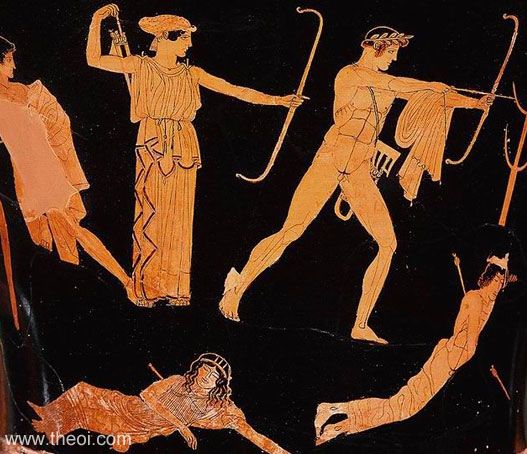
LOCALE : Thebes, Boiotia (Central Greece)
Homer, Iliad 24. 602 ff (trans. Lattimore) (Greek epic C8th B.C.) :
"Niobe's twelve children were destroyed in her palace, six daughters, and six sons in the pride of their youth, whom Apollon killed with arrows from his silver bow, being angered with Niobe, and Artemis shaft-showering (iokheaira) killed the daughters; because Niobe likened herself to Leto of the fair-colouring and said Leto had borne only two, she herself had borne many; but the two, though they were only two, destroyed all those others. Nine days long they lay in their blood, nor was there anyone to bury them, for the son of Kronos [Zeus] had made stones out of the people; but on the tenth day the Ouranion gods buried them. But she remembered to eat when she was worn out with weeping. And now somewhere among the rocks, in the lonely mountains, in Sipylos, where they say is the resting place of the goddesses who are Nymphai, and dance beside the waters of Akheloios, there, stone still, she broods on the sorrows that the gods gave her."
Aeschylus, Niobe (lost play) (Greek tragedy C5th B.C.) :
This lost drama described the story of Niobe whose fourteen children were slaughtered by the gods Apollon and Artemis to punish her for boasts which had insulted their mother Leto. According to Weir Smyth (L.C.L.) : "The place and progress of the action of this famous drama cannot be determined with any certainty. Sources other than the text inform us that Aeschylus gave Niobe fourteen children, a number adopted by Euripides and Aristophanes."
Pseudo-Apollodorus, Bibliotheca 3. 46 (trans. Aldrich) (Greek mythographer C2nd A.D.) :
"Amphion married Niobe, the daughter of Tantalos, who bore him seven sons . . . and as many daughters . . . With her fine brood Niobe claimed to be more blest with children than Leto. Leto was annoyed by this, and urged Artemis and Apollon against Niobe's children. Artemis killed all the females in the house with her arrows, an Apollon all the males as they were hunting together on Mount Kithairon. Of the males only Amphion was spared, and of the females only Khloris the elder, whom Neleus married. According to Telesilla, Amyklas and Meliboia were spared, and Amphion was shot down by them. As for Niobe, she left Thebes and went to her father Tantalos at Sipylos, where, after a prayer to Zeus, her form was turned to stone, from which tears flow by night and by day."
Quintus Smyrnaeus, Fall of Troy 1. 390 ff ff (trans. Way) (Greek epic C4th A.D.) :
"Sipylos the Mountain, where the Gods made Niobe a stony rock, wherefrom tears ever stream: high up, the rugged crag bows as one weeping, weeping, waterfalls cry from far-echoing Hermos, wailing moan of sympathy : the sky-encountering crests of Sipylos, where alway floats a mist hated of shepherds, echo back the cry. Weird marvel seems that Rock of Niobe to men that pass with feet fear-goaded: there they see the likeness of a woman bowed, in depths of anguish sobbing, and her tears drop, as she mourns grief-stricken, endlessly. Yea, thou wouldst say that verily so it was, viewing it from afar; but when hard by thou standest, all the illusion vanishes; and lo, a steep-browed rock, a fragment rent from Sipylus--yet Niobe is there, dreeing her weird, the debt of wrath divine [her children slain by Apollon and Artemis], a broken heart in guise of shattered stone."
Pausanias, Description of Greece 2. 21. 9 (trans. Jones) (Greek travelogue C2nd A.D.) :
"When the children of Amphion were destroyed by Apollon and Artemis, she [Khloris] alone of her sisters, along with Amyklas escaped; their escape was due to their prayers to Leto."
Pausanias, Description of Greece 9. 5. 9 :
"It is also said that Amphion [husband of Niobe] is punished in Hades for being among those who made a mock of Leto and her children."
Diodorus Siculus, Library of History 4. 74. 3 (trans. Oldfather) (Greek historian C1st B.C.) :
"Niobe became the mother of seven sons and an equal number of daughters, maids of exceeding beauty. And since she gave herself haughty airs over the number of her children, she frequently declared in boastful way that she was more blest in her children than was Leto. At this, so the myths tell us, Leto in anger commanded Apollon to slay with his arrows the sons of Niobe and Artemis the daughters. And when these two hearkened to the command of their mother and slew with their arrows the children of Niobe at the same time, it came to pass that immediately this woman was both blest with children and childless."
Pseudo-Hyginus, Fabulae 9 (trans. Grant) (Roman mythographer C2nd A.D.) :
"Amphion took in marriage Niobe . . . by whom he had seven sons and as many daughters. These children Niobe placed above those of Latona [Leto], and spoke rather contemptuously against Apollo and Diana [Artemis] because Diana was girt in man's attire, and Apollo wore long hair and a woman's gown. She said, too, that she surpassed Latona in muber of children. Because of this Apollo slew her sons with arrows as they were hunting in the woods on Mount Sipylus, and Diana shot and killed the daughters in the palace, all except Chloris."
Ovid, Metamorphoses 6. 146 ff (trans. Melville) (Roman epic C1st B.C. to C1st A.D.) :
"[Niobe disparages the goddess Leto with her boasts :] ‘Add my seven sons and seven daughters and soon my sons' wives and my son-in-laws. Now ask yourselves the reason for my pride, and dare prefer me to that Titanis [she-Titan], whom Coeus sired, whoever he may be, Latona whom the great globe once refused the smallest spot to give her children birth. Not earth, nor sky, nor water would accept your goddess, outcast from the world, until Delos took pity on her wanderings . . . She bore two children; so her womb was worth a seventh part of mine [i.e. Niobe had fourteen children]. O happy me! (Who would deny it?) And happy I'll remain (Who could doubt that?) . . . My blessings banish fear. Suppose some part of this my clan of children could be lost, and I bereft, I'll never be reduced to two, Latona's litter - near enough childless! Away with you! Enough of this! Remove those laurels from your hair!’
With wreaths removed, they left the ritual unfinished. They worshipped, as they might, in silent words. The goddess [Leto] was outraged; upon the peak of Cynthus she addressed her pair of twins : ‘I, here, your mother, proud to have borne you both, I, who will give no goddess precedence save Juno [Hera], find that my divinity is doubted and unless you children help I'm barred from shrines and altars evermore. Nor is this all that hurts. To injury Tantalis [Niobe, daughter of Tantalos] adds insult. Yes, she dares set her own children above you, and calls me childless--may that fall on her own head! Her wicked tongue shows her paternity!’
To this sad tale Latona had in mind to add to her entreaties, when ‘Enough!’ said Phoebus [Apollon], ‘Long complaints do but delay the punishment,’ and Phoebe [Artemis] said the same. Then clothed in cloud they glided swiftly down and reached the citadel of Cadmeia [Thebes] [and there Apollon slew the seven sons of Niobe with his arrows] . . .
[Niobe] cried ‘Feast, cruel Latona, feast upon my grief! Yes, glut your savage heart! On seven biers I'm borne. Exult! Triumph in victory! Even so, why victory? My wretchedness still gives me more than you your happiness: after so many deaths I triumph still [so she brags of her seven daughters]!’
Hard on her words a bowstring twanged, and all were terrified, save only Niobe. Disaster made her bold. In robes of black, with hair unbound, beside their brothers' biers the sisters stood. One of them, as she wrenched an arrow from her vitals, swooned away, her cheek upon her brother. One, who tried to comfort her poor mother, suddenly was silent, doubled by an unseen wound. One, in vain flight, collapsed; another died upon her sister. One concealed herself, one trembled there for all to see. So six with one wound or another met their deaths. The last was left. Her mother shielded her with her whole body, her whole dress, and cried, ‘Leave me my one, my littlest!’ As she begged, the one she begged for fell. She sat bereft amid her sons, her daughters and her husband, all lifeless corpses, rigid in her ruin [and she herself was turned into a weeping stone]."
Nonnus, Dionysiaca 48. 395 ff (trans. Rouse) (Greek epic C5th A.D.) :
"[Nemesis the goddess of retribrution addresses Artemis :] ‘If some prolific wife provokes your mother Leto, let her weep for her children, another Niobe of stone. Why should not I make another stone on Sipylos? . . . But if some woman is persecuting you as one did your mother Leto, I will be the avenger of the offended Archeress. . .’
[Artemis] broke in and said to the goddess who saves men from evil : ‘. . . I have suffered just as my mother did: we are both alike--in Phrygia Niobe offended Leto the mother of twins, in Phrygia again impious Aura offended me. But Niobe paid for it by passing into a changeling form, that daughter of Tantalos whose children were her sorrow, and she still weeps with stony eyes.’"
ARTEMIS WRATH : GIANT TITYUS
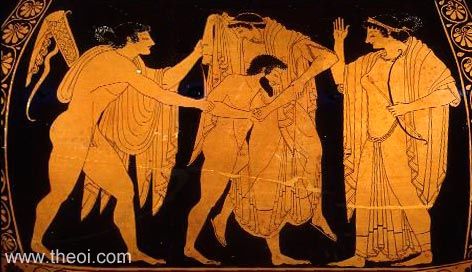
LOCALE : Panopeia, Phokis (Central Greece)
Pindar, Pythian Ode 4 ep4 (trans. Conway) (Greek lyric C5th B.C.) :
"Tityos by Artemis was hunted down with darts from her unconquerable quiver suddenly sped [for attempting to rape her mother], so that a man may learn to touch only those loves that are within his power."
Pseudo-Apollodorus, Bibliotheca 1. 22 (trans. Aldrich) (Greek mythographer C2nd A.D.) :
"Tityos saw Leto when she came to Pytho and in a fit of passion tried to embrace her. But she called out to her children [Apollon & Artemis], who shot him dead with arrows. He is being punished even in death, for vultures feast on his heart in Hades' realm."
Callimachus, Hymn 3 to Artemis 109 ff (trans. Mair) (Greek poet C3rd B.C.) :
"Artemis, Lady of Maidenhood, Slayer of Tityos."
Nonnus, Dionysiaca 48. 395 ff (trans. Rouse) (Greek epic C5th A.D.) :
"[Nemesis addresses Artemis :] ‘What impious son of Earth persecutes you? . . . Has Tityos risen again rolling a lovemad eye, and touched the robe of your untouchable mother [Leto]? Where is your bow, Artemis, where are Apollon's arrows?’"
For MORE information on this giant see TITYOS
ARTEMIS WRATH : DRAGON PYTHON
LOCALE : Delphoi, Phokis (in Central Greece)
Pausanias, Description of Greece 2. 7. 6 (trans. Jones) (Greek travelogue C2nd A.D.) :
"When Apollon and Artemis had killed Python they came to Aigialea [Korinthos] to obtain purification . . . they were turned away and came to Karmanor in Krete [instead, for the purification]."
Pseudo-Hyginus, Fabulae 140 (trans. Grant) (Roman mythographer C2nd A.D.) :
"Python knew that Latona [Leto] was pregnant by Jove [Zeus], he followed her to kill her [through the prompting of Hera]. But by order of Jove the wind Aquilo [Boreas] carried Latona away . . . [to Ortygia where] clinging to an olive tree, she bore Apollo and Diana [Artemis], to whom Vulcanus [Hephaistos] gave arrows as gifts. Four days after they were born, Apollo exacted vengeance for his mother. For he went to Parnassus and slew Python with his arrows."
For MORE information on this dragon-serpent see PYTHON
ARTEMIS WRATH : ALOADAE GIANTS
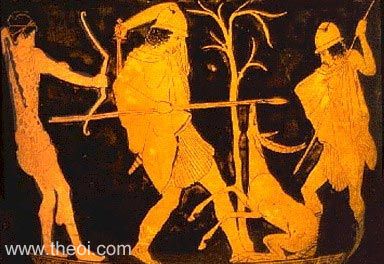
LOCALE : Naxos (Greek Aegean) OR Thessalia (Northern Greece)
Pseudo-Apollodorus, Bibliotheca 1. 53 (trans. Aldrich) (Greek mythographer C2nd A.D.) :
"Poseidon mated with her [Iphimedeia] and fathered two sons, Otos and Ephialtes, who were known as Aloadai. Each year these lads grew two feet in width and six feet in length. When they were nine years old and measured eighteen feet across by fifty four feet tall, they decided to fight the gods. So they set Mount Ossa on top of Mount Olympos, and then placed Mount Pelion on top of Ossa, threatening by means of these mountains to climb up to the sky . . . Ephialtes paid amorous attention to Hera, as did Otos to Artemis . . . Artemis finished off the Aloadai in Naxos by means of a trick: in the likeness of a deer she darted between them, and in their desire to hit the animal they speared each other."
Callimachus, Hymn 3 to Artemis 262 ff (trans. Mair) (Greek poet C3rd B.C.) :
"Neither let any woo the Maiden [Artemis]; for not Otos, nor Orion wooed her to their own good."
Pseudo-Hyginus, Fabulae 28 (trans. Grant) (Roman mythographer C2nd A.D.) :
"Other writers, however, say that they [the Gigantes Otos and Ephialtes] were invulnerable sons of Neptunus [Poseidon] and Iphimede. When they wished to assault Diana [Artemis], she could not resist their strength, and Apollo sent a deer between them. Driven mad by anger in trying to kill it with javelins, they killed each other. In the Land of the Dead they are said to suffer this punishment: they are bound by serpents to a column, back to back. Between them is a screech-owl [a bird which was believed to drink blood], sitting on the column to which they are bound."
Nonnus, Dionysiaca 48. 395 ff (trans. Rouse) (Greek epic C5th A.D.) :
"[Nemesis addresses Artemis :] ‘What impious son of Earth persecutes you? . . . If bold Otos again, or boastful Ephialtes, has desired to win your love so far beyond his reach, then slay the pretender to your unwedded virginity.’"
For MORE information on these giants see ALOADAI
ARTEMIS WRATH : ACTAEON
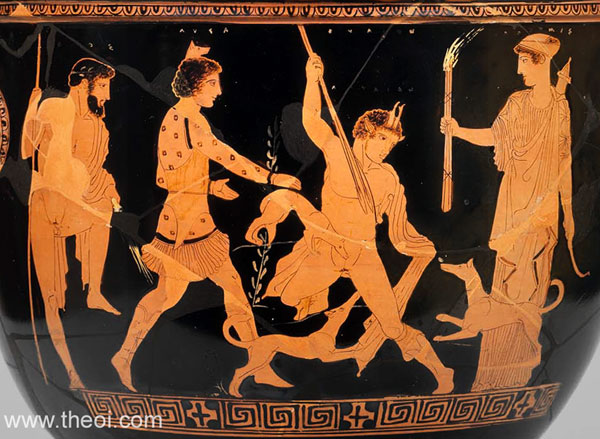
LOCALE : Mount Kithairon, Boiotia (Central Greece)
Aeschylus, Toxotides (lost play) (Greek tragedy C5th B.C.) :
Aeschylus' Toxotides told the story of Aktaion who was turned into a stag and torn apart by his own dogs. According to Weir Smyth (L.C.L.) "The common version of the legend--that he was punished by Artemis for having seen her bathing--seems to have been adopted by Aeschylus. The Chorus of Archer-Maidens (Toxotides) were nymphs, attendants of Artemis in the chase."
Aeschylus, Fragment 135 Toxotides (from Scholiast A on Iliad I. 593) (trans. Weir Smyth) (Greek tragedy C5th B.C.) :
"The dogs destroyed their master [Aktaion] utterly."
Pseudo-Apollodorus, Bibliotheca 3. 30 (trans. Aldrich) (Greek mythographer C2nd A.D.) :
"To Autonoe and Aristaios was born a son Aktaion, who was reared by Kheiron and trained as a huntsman, but was later eaten up on Kithairon by his own dogs [because] . . . he saw Artemis bathing. They say that the goddess changed him on the spot into a deer, and drove his fifty hunting dogs into a frenzy so that they unintentionally ate him. When he was no more, they looked for their master with great howls and bays, coming in the course of their search to Kheiron's cave. He made a likeness of Aktaion, which assuaged their grief."
Callimachus, Hymn 5 The Bath of Pallas 106 ff (Greek poet C3rd B.C.) :
"How many burnt offerings shall the daughter of Kadmos burn in the days to come? How many Aristaios?--praying that they might see their only son, the young Aktaion blind. And yet he shall be companion of the chase to great Artemis. But him neither the chase nor comradeship in archery on the hills shall save in that hour, when, albeit unwillingly, he shall behold the beauteous bath of the goddess. Nay, his own dogs shall then devour their former lord. And his mother shall gather the bones of her son, ranging over all the thickets."
Pausanias, Description of Greece 9. 2. 3 (trans. Jones) (Greek travelogue C2nd A.D.) :
"On the road from Megara [cross Mt Kithairon to Plataia in Boiotia] there is a spring on the right, and a little farther on a rock. It is called the bed of Aktaion, for it is said that he slept thereon when weary with hunting, and that into this spring he looked while Artemis was bathing in it. Stesikhoros of Himera says that the goddess cast a deer-skin round Aktaion to make sure that his hounds would kill him, so as to prevent his taking Semele to wife. My own view is that without divine interference the hounds of Aktaion were smitten with madness, and so they were sure to tear to pieces without distinction everybody they chanced to meet."
Diodorus Siculus, Library of History 4. 81. 3 - 5 (trans. Oldfather) (Greek historian C1st B.C.) :
"Aktaion, who, as the myths relate, was torn to pieces by his own dogs.The reason for this bad turn of fortune of his, as some explain it, was that, presuming upon his dedication to Artemis of the first-fruits of his hunting, he purposed to consummate the marriage with Artemis at the temple of the goddess, but according to others, it was because he represented himself as superior to Artemis in skill as a hunter.
But it is not incredible that it was for both these reasons that the goddess became angry; for whether Aktaion made an improper use of the spoils of his hunting to satisfy his own desire upon her who has no part in marriage, or whether he was so bold as to assert that as a hunter he was to be preferred above her before whom even gods withdraw from rivalry in the chase, all would agree that the goddess was justified in having become indignant at him. And, speaking generally, we may well believe that, when he had been changed into the form of one of the animals which he was wont to hunt, he was slain by the gods which were accustomed to prey upon the other wild beasts."
Pseudo-Hyginus, Fabulae 180 (trans. Grant) (Roman mythographer C2nd A.D.) :
"Actaeon, son of Aristaeus and Autonoe, a shepherd, saw Diana [Artemis] bathing and desired to ravish her. Angry at this, Diana [Artemis] made horns grow on his head, and he was devoured by his own dogs."
Pseudo-Hyginus, Fabulae 181 :
"When Diana [Artemis], wearied from constant hunting in the thickly shadowed valley of Gargaphia, in the summertime was bathing in the stream called Parthenius (of the Maiden), Actaeon, grandson of Cadmus, son of Aristaeus and Autonoe, sought the same place for cooling himself and the dogs which he had exercised in chasing wild beasts. He caught sight of the goddess, and to keep him from telling ot it, she changed him into a stag. As a stag, then, he was mangled by his own hounds. Their names were (these are all male): Melampus, Ichnobates, Echnobas, Pamphagos, Dorceus, Oribasus, Nebrophonus, Laelap, Theron, Pterelas, Hylaeus, Nape, Ladon, Poemenis, Therodanapis, Aura, Lacon, Harpyia, Aello, Dromas, Thous Canache, Cyprius, Sticcte, Labros, Arcas, Agriodus, Tigris, Hylactor, Alce, Harpalus, Lycisca, Melaneus, Lachne, Leucon. Likewise there who devoured him - females: Melanchaetes, Agre, theridamas, Oreistrophos. Other authors give these names too: Acamas, Syrus, Leon, Stilbon, Agrius, Charops, Aethon, Corus, Boreas, Draco, Eudromus, Dromius, Zephyrus, Lampus, Haemon, Cyllopodes, Harpalicus, Machimus, Ichneus, Melampus, Ocydromus, Borax, Ocythous, Pachylus, Obrimus; and females: Argo, Arethusa, Urania, Theriope, Dinomache, Dioxippe, Echione, Gorgo, Cyllo, Harpyia, Lynceste, Leaena, Lacaena, Ocyptete, Ocydrome, Oxyrhoe, Orias, Sagnos, Theriphone, Volatos, Chediaetros."
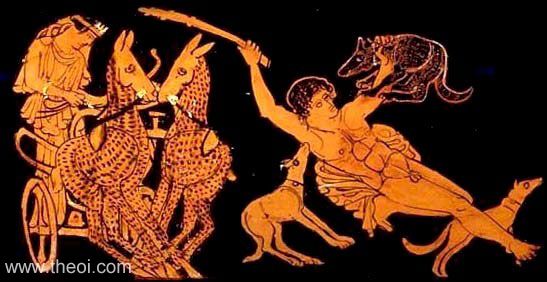
Ovid, Metamorphoses 3. 138 ff (trans. Melville) (Roman epic C1st B.C. to C1st A.D.) :
"In his prosperity a grandson first [the hunter Aktaion] was source of Cadmus' sorrow, whose young brow sprouted outlandish antlers and the hounds, his hounds, were sated with their master's blood. Though, if you ponder wisely, you will find the fault was fortune's and no guilt that day, for what guilt can it be to lose one's way? Upon a mountainside, whose woodland coverts were stained with many a kill of varied game, the shining noon had narrowed all the shade and midway at his zenith stood the sun. Then young Hyantius [Aktaion] was content; he called his comrades as they roamed the lonely woods : ‘Come friends, our nets are wet, our javelins drip with our quarries blood; today has brought success enough; tomorrow, when Aurora (the Dawn) [Eos] on saffron wheels leads on another day, we'll start our work again; now Phoebus [Helios the Sun] shines half-way upon his journey and his rays crack the parched countryside. Take up your nets; here let us end the work in hand.’
The men obeyed his words and rested from their toil. There was a valley clothed in hanging woods of pine and cypress, named Gargaphie, sacred to chaste Diana [Artemis], huntress queen. Deep in its farthest combe, framed by the woods, a cave lay hid, not fashioned by man's art, but nature's talent copied artistry, for in the living limestone she had carved a natural arch; and there a limpid spring flowed lightly babbling into a wide pool. Its waters girdled with a grassy sward. Here, tired after the hunt, the goddess loved her Nymphae to bathe her with the water's balm. Reaching the cave, she gave her spear and quiver and bow unstrung to an attendant Nympha; others received her robes over their arms; two loosed her sandals; more expert than these Crocale tied the hair loose on her shoulders into a knot, her own hair falling free. Then Nephele and Hyale and Rhanis and Phiale and Psecas brought the water in brimming jars and poured it over her. And while Titania [Artemis] bathed there in the pool, her loved familiar pool, it chanced the grandson of Cadmus [Aktaion], the day's hunt finished, idly wandering through unknown clearings of the forest, found the sacred grove--so fate guided him--and came upon the cool damp cave. At once, seeing a man, all naked as they were, the Nymphae, beating their breasts, filled the whole grove with sudden screams and clustered round Diana [Artemis] to clothe her body with their own. But she stood taller, a head taller than them all; and as the clouds are coloured when the sun glows late and low or like the crimson dawn, so deeply blushed Diana [Artemis], caught unclothed. Her troop pressed close about her, but she turned aside and looking backwards (would she had her arrows ready!) all she had, the water, she seized and flung it in the young man's face, and as the avenging downpour drenched his hair she added words that warned of doom : ‘Now tell you saw me here naked without my clothes, if you can tell at all!’
With that one threat antlers she raised upon his dripping head, lengthened his neck, pointed his ears, transformed his hands to hooves, arms to long legs, and draped his body with a dappled hide; and last set terror in his heart. Autoreis [Aktaion] fled, royal Actaeon, and marvelled in his flight at his new leaping speed, but, when she saw his head and antlers mirrored in a stream, he tries to say ‘Alas!’--but no words came; he groaned--that was his voice; the tears rolled down on cheeks not his--all changed except his mind. What should he do? Go home, back to the palace, or stay in hiding in the forest? Shame forbade the first decision, fear the other.
While thus he stood in doubt his hounds had seen him. Melampus (Blackfoot) and Ichnobates (Tracker) first gave tongue, wise Ichnobates Cnosius (Tracker a Cretan hound), Melampus (Blackfoot) of Spartan breed; swift as the wind the rest came rushing on: Dorceus (Glance), Pamphagos (Glutton), Oribasos (Ranger) (all from Arcady), fierce Nebrophonos (Rover), sturdy Theron (Stalker), moody Laelaps (Storm), Pterelas (Flight) unsurpassed for speed, Agre (Hunter) for scent, bold Hylaeus (Woodman) lately wounded by a boar, Nape (Dingle) a slender bitch sired by a wolf, Poemenis (Snatch) with two pups, gaunt Harpyia Sicyonius (Catch from Sicyon), and Ladon (Shepherd), once a guardian of her flock; Dromas (Spot), Canache (Gnasher), Tigris (Tigress), Sticte (Courser), Alce (Strong), dark-coated Asbolos (Sooty), Leucon (Blanche) with snowy hair, Lycisce (Wolf) and his nimble brother Cyprius (Cyprian), huge stalwart Lacon (Spartan), Aello (Tempest) never tired; Thoos (Clinch), his dark forehead crowned with a white star, Melaneus (Blackie); rough-coated Harpalos (Shag); a couple of hounds born of a Cretan sire and Spartan dam, Labros (Fury) and Argiodus (Whitetooth); Hylactor (Barker), noisy bitch; and many more too long to tell.
The pack, hot in pursuit, sped on over fells and crags, by walls of rock, on daunting trails or none he fled where often he'd followed in pursuit, fled his own folk, for shame! He longed to shout ‘I am Actaeon, look, I am your master!’ Words failed his will; their baying filled the sky. Melanchaetes (Blackhair) bit first, a wound deep in his haunch; next Theridamas (Killer); Oresitrophus (Climber) fastened on his shoulder. These started late but cut across the hills and gained a lead. They held their master down till the whole pack, united, sank their teeth into his flesh. He gave a wailing scream, not human, yet a sound no stag could voice, and filled with anguished cries the mountainside he knew so well; then, suppliant on his knees, turned his head silently from side to side, like arms that turned and pleaded. But his friends with their glad usual shouts cheered on the pack. Not knowing what they did, and looked around to find Actaeon; each louder than the rest calling Actaeon, as though he were not there; and blamed his absence and his sloth that missed the excitement of the kill. Hearing his name, he turned his head. Would that he were indeed absent! But he was there. Would that he watched, not felt, the hounds' (his hounds') fierce savagery! Now they are all around him, tearing deep their master's flesh, the stag that is no stag; and not until so many countless wounds had drained away his lifeblood, was the wrath, it's said, of chaste Diana [Artemis] satisfied. As the tale spread views varied; some believed Diana's violence unjust; some praised it, as proper to her chaste virginity. Both sides found reason for their point of view."
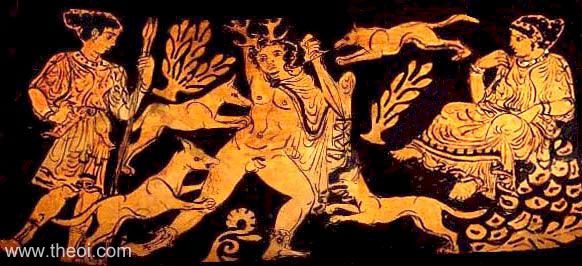
Seneca, Oedipus 751 ff (trans. Miller) (Roman tragedy C1st A.D.) :
"What of the doom of Cadmus' grandson, when the antlers of the long-lived stag covered his brow with their strange branches, and his own hounds pursued the master? Headlong from the woods and mountains the swift Actaeon fled, and with feet more nimble, scouring glades and rocky places, shuddered at the feathers fluttering in the breeze, and avoiding the snares he himself had set; at length he gazed into the still pool's water and saw his horns and his beast-like countenance. 'Twas in tha same pool the goddess [Artemis] of too stern chastity had bathed her virgin limbs!"
Nonnus, Dionysiaca 5. 480 ff (trans. Rouse) (Greek epic C5th A.D.) :
"I [Aktaion, deliberately] climbed a tree to look on the Archeress's [Artemis'] body with bold eyes . . . The Naiades all shrieked together; Loxo cried aloud with Oupis in concert, and checked her sister Hekaerge who was swimming in the calm stream."
[Part of a long version by Nonnus of this story, for the entire passage see Nonnus, Book 5.]
Other sources not currently quoted here: Euripides, Bacchae 230, 340; Statius, Thebaid 4.573; Dionysiaca.
ARTEMIS WRATH : LEIMON
LOCALE : Tegea, Arkadia (Southern Greece)
Pausanias, Description of Greece 8. 53. 1 (trans. Jones) (Greek travelogue C2nd A.D.) :
"Apollon and Artemis, they say, throughout every land visited with punishment all the men of that time who, when Leto was with child and in the course of her wanderings, took no heed of her when she came to their land. So when the divinities came to the land of Tegea, Skephros, they say, the son of Tegeates, came to Apollon and had a private conversation with him. And Leimon, who also was a son of Tegeates, suspecting that the conversation of Skephros contained a charge against him, rushed on his brother and killed him. Immediate punishment for the murder overtook Leimon, for he was shot by Artemis."
ARTEMIS WRATH : BUPHAGUS
LOCALE : Arkadia (Southern Greece)
Pausanias, Description of Greece 8. 27. 17 (trans. Jones) (Greek travelogue C2nd A.D.) :
"The river [Bouphagos near Megalopolis] got its name, they say, from a hero called Bouphagos, the son of Iapetos [perhaps the Titan] and Thornax. This is what they call her in Lakonia also. They also say that Artemis shot Bouphagos on Mount Pholoe because he attempted an unholy sin against her godhead."
ARTEMIS WRATH : GIANT ORION
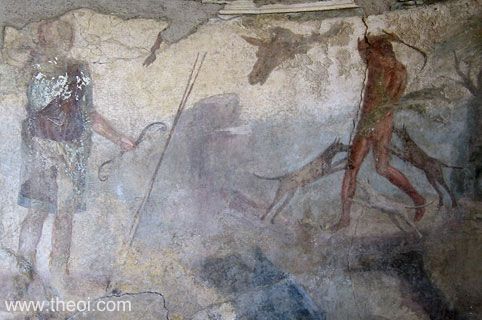
LOCALE : Delos (Greek Aegean) OR Krete (Greek Aegean)
VERSION 1 (Slain by Artemis in wrath)
Homer, Odyssey 5. 119 ff (trans. Shewring) (Greek epic C8th B.C.) :
"[Kalypso laments the departure of Odysseus :] ‘You are merciless, you gods, resentful beyond all other things; you are jealous if without disguise a goddess makes a man her bedfellow, her beloved husband. So it was when Eos (Dawn) of the rosy fingers chose out Orion; you gods who live in such ease yourselves were jealous of her until chaste (hagne) Artemis of the golden throne (khrysothronos) visited him with her gentle shafts and slew him in Ortygia.’"
Pseudo-Apollodorus, Bibliotheca 1. 25 (trans. Aldrich) (Greek mythographer C2nd A.D.) :
"Artemis slew Orion on Delos. He was said to be a Gigas (Giant) of massive proportions born of Ge (Earth) . . . From Poseidon he was given the power of walking across the sea . . . Eos, whom Aphrodite taunted with constant passion as punishment for sleeping with Ares, fell in love with Orion and took him off with her to Delos. There he was killed, according to some, for challenging Artemis to a discus match. Others say that Artemis shot him as he was forcing his attention on Opis, a virgin who had come from the Hyperboreans."
Callimachus, Hymn 3 to Artemis 262 ff (trans. Mair) (Greek poet C3rd B.C.) :
"Neither let any woo the Maiden [Artemis]; for not Otos, nor Orion wooed her to their own good."
Antoninus Liberalis, Metamorphoses 25 (trans. Celoria) (Greek mythographer C2nd A.D.) :
"Artemis took him [Orion] away from the sight of mankind."
Pseudo-Hyginus, Fabulae 195 (trans. Grant) (Roman mythographer C2nd A.D.) :
"When he [Orion] tried to violate Diana [Artemis], she killed him."
Pseudo-Hyginus, Astronomica 2. 34 :
"[The Constellation Orion :] Orion came to Crete, and there began to hunt with Diana [Artemis]. He made the boast to her we have mentioned before, and thus came to the stars. Some say that Orion lived with Oenopion in too close intimacy, and wanting to prove to him his zeal in hunting, boasted to Diana [Artemis], too, what we spoke of above, and so was killed. Others, along with Callimachus [Alexandrian poet C3rd BC], say that when he wished to offer violence to Diana [Artemis], he was transfixed by her arrows and fashioned for the stars because of their similar zeal in hunting."
Valerius Flaccus, Argonautica 4. 104 ff (trans. Mozley) (Roman epic C1st A.D.) :
"Hapless Orion fell by the cruel virgin's [Artemis'] shaft and now fills Chaos [the Air, which Orion fills as a constellation]."
Statius, Thebaid 7. 255 ff (trans. Mozley) (Roman epic C1st A.D.) :
"The son of exalted Orion: heaven forfend the ill omen of his sire, and chaste Diana's [Artemis'] ancient grudge."
Nonnus, Dionysiaca 48. 395 ff (trans. Rouse) (Greek epic C5th A.D.) :
"[Nemesis addresses Artemis :] ‘What impious son of Earth persecutes you? . . . What Orion is using force against you once more? The wretch that touched your dress still lies in his mother's flanks, a lifeless corpse; if any man has clutched your garments with lustful hands, grow another scorpion to avenge your girdle.’"
VERSION 2 (Friend of Artemis, slain by Gaia)
For this VERSION of the story see Artemis Favour: Orion
VERSION 3 (Beloved of Artemis, the goddess tricked into slaying him by Apollon)
For this VERSION of the story see Artemis Favour: Orion
For MORE information on this giant see ORION
ARTEMIS WRATH : SIPRIOTES
This story is not currently quoted here. It is related by Antoninus Liberalis in the seventeenth story of his Metamorphoses.
SOURCES
GREEK
- Homer, The Iliad - Greek Epic C8th B.C.
- Homer, The Odyssey - Greek Epic C8th B.C.
- Pindar, Odes - Greek Lyric C5th B.C.
- Aeschylus, Fragments - Greek Tragedy C5th B.C.
- Apollodorus, The Library - Greek Mythography C2nd A.D.
- Callimachus, Hymns - Greek Poetry C3rd B.C.
- Pausanias, Description of Greece - Greek Travelogue C2nd A.D.
- Antoninus Liberalis, Metamorphoses - Greek Mythography C2nd A.D.
- Quintus Smyrnaeus, Fall of Troy - Greek Epic C4th A.D.
- Nonnus, Dionysiaca - Greek Epic C5th A.D.
ROMAN
- Hyginus, Fabulae - Latin Mythography C2nd A.D.
- Hyginus, Astronomica - Latin Mythography C2nd A.D.
- Ovid, Metamorphoses - Latin Epic C1st B.C. - C1st A.D.
- Seneca, Oedipus - Latin Tragedy C1st A.D.
- Valerius Flaccus, The Argonautica - Latin Epic C1st A.D.
- Statius, Thebaid - Latin Epic C1st A.D.
BIBLIOGRAPHY
A complete bibliography of the translations quoted on this page.